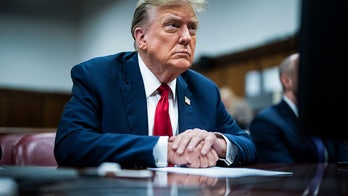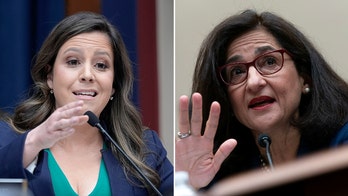President Obama will not declare "Mission Accomplished" on Tuesday night, but as combat operations in Iraq end, the man who once said it was a "dumb war," will call former President George W. Bush, a man Obama has blamed for the U.S. involvement in Iraq, before addressing the nation from the Oval Office.
White House Press Secretary Robert Gibbs declined to preview what Mr. Obama would say to former President Bush, but he did say while Obama may have opposed the war in Iraq and the 2007 surge, he always believed there could be some final solution to the war."The president always believed that you would change part of the security situation by vastly increasing the number of troops," Gibbs said at the White House briefing on Monday. "But, again, I think it was important - and the president was criticized for this throughout the campaign - for saying we were not going to accomplish all of what needed to be done in Iraq simply militarily, that there had to be a political accommodation." The comments from Gibbs seem to counter what candidate Obama said himself while on the Hill, serving as a Senator, as the lead up to the surge began.
In January 2007, the night the surge was announced, Obama said "I am not persuaded that 20,000 additional troops in Iraq are going to solve the sectarian violence there. In fact, I think it will do the reverse." And just a few weeks later, after the January 23 State of the Union by President Bush, Obama said, "I don't think the president's strategy is going to work. We went through two weeks of hearings on the Senate Foreign Relations Committee; experts from across the spectrum--military and civilian, conservative and liberal--expressed great skepticism about it. My suggestion to the president has been that the only way we're going to change the dynamic in Iraq and start seeing political commendation is actually if we create a system of phased redeployment. And, frankly, the president, I think, has not been willing to consider that option, not because it's not militarily sound but because he continues to cling to the belief that somehow military solutions are going to lead to victory in Iraq."
As candidate Obama prepared to run for president, he took his feelings on the surge and war in Iraq on the road. While other Democrats in early primaries (Bill Richardson and John Edwards) had very aggressive withdrawl plans, in the end, Obama won support from the left and away from his main opponent, then Senator Hillary Clinton, in light of her vote in favor to invade Iraq and her slow response in opposing the Bush management of the insurgency.
While it's true that candidate Obama always stressed the need for a political solution, President Obama finds himself at an odd crossroads. With combat operations ending for the U.S. troops and more than five months since general elections, Iraq remains a country with no government. Vice President Biden, who arrived in the country on Monday, was meeting with various leaders in the hopes to help push forward a solution. After meeting with U.S. Ambassador to Iraq Jim Jeffry and outgoing U.S. Commander Ray Odierno, Biden was asked by a reporter about the political stalemate. According to reporters on the ground with the Vice President, Mr. Biden said "We are going to be just fine. They are going to be just fine."
It's a sentiment the White House is banking on as advisers admit that while one chapter is ending for the U.S. mission, it does not necessarily mean the end of support for the country. "They will write the next chapter in Iraqi history, and they will be principally responsible for it. We will be their ally, but the responsibility of charting the future of Iraq first and foremost belongs to the Iraqis," Gibbs said Monday.
Biden's National Security Adviser Tony Blinken echoed Gibbs' remarks, saying there's no deadline for the government to form and it's not the place of the United States to ask for one. "What we are doing and can do is to suggest to the Iraqi leaders that both in terms of the desires of the Iraqi people to see a government form and the ability to get on with the important business of moving Iraq forward, forming a government is critical and getting that done as quickly as they can is critical. But there is no timeline, deadline. That has to be up to them." Blinken told reporters traveling with the Vice President.
As for those who witnessed the 2007 surge, they say no matter what Obama says Tuesday night, the evening will belong to former President George W. Bush. "This war, and the surge, was George Bush's decision. The result of that was a decrease in a level of violence by a factor of 10 and you can't argue with that," says Fox News Contributor Retired Major General Bob Scales. "Compare conditions in Iraq in 2007, with conditions today. That is because of the courage and decision making of Bush and his advisers."
And while Scales admits things are not perfect in Iraq, the U.S. military has done strong work on the ground. "Be very careful when you bet against the American soldier. Our soldiers, at the end of the day, have a remarkable track record for doing the right thing and accomplishing the mission."
The White House says the speech on Tuesday night will run approximately 15 minutes. Tune into Fox News Channel to watch the speech and coverage by the Fox News team.




